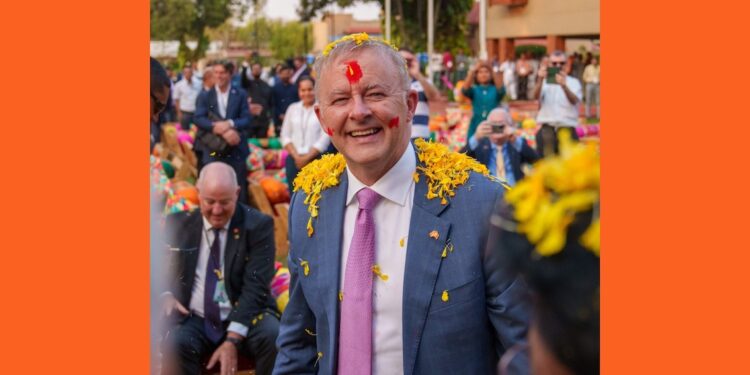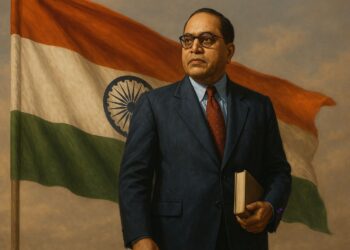On Saturday, Prime Minister Anthony Albanese visited the BAPS Swaminarayan temple in Sydney to celebrate Holi, a festival of colours symbolising unity and renewal. The visit—widely seen as an attempt to court Australia’s growing and electorally significant Hindu community—came on the same day as the International Day to Combat Islamophobia, when Albanese issued a strong statement condemning all forms of hatred against Muslims.
At first glance, both acts reflect a leader embracing multiculturalism and standing against discrimination. However, a closer examination exposes troubling contradictions and blind spots in his approach.
The Hindu Vote and a Temple’s Controversial History
The temple Albanese visited belongs to the BAPS Swaminarayan sect, which has its origins in Gujarat, India. While BAPS temples are admired for their grand architecture and spiritual influence, the sect has also been embroiled in several controversies. In the United States, BAPS has faced allegations of labour exploitation, particularly of Dalit workers—one of the most oppressed groups in the Hindu caste hierarchy. A 2021 lawsuit accused the organisation of forced labour, visa fraud, and keeping workers in prison-like conditions while building a temple in Robbinsville, New Jersey.
Moreover, despite promoting peace after a 2002 terrorist attack on their own temple in Gujarat, BAPS was notably silent on the anti-Muslim pogroms that took place in the same state earlier that year, in which thousands of Muslims were killed, violated, or displaced. Given that Albanese visited this temple on the very day he was making strong statements against Islamophobia, the juxtaposition raises uncomfortable questions about his selective approach to combating religious discrimination.
Australia’s Political Overtures to Hindu Nationalism
Both Albanese and his predecessor, Scott Morrison, have courted India’s Prime Minister Narendra Modi and his Hindu nationalist BJP government, despite global concerns about India’s democratic backsliding. Under Modi’s rule, India has witnessed a sharp rise in Islamophobia, attacks on press freedom, and the suppression of dissent. Discriminatory laws targeting interfaith marriages and the systematic persecution of Muslims are widely documented. Yet, Australian leaders seem more focused on strengthening economic and strategic ties with India, ignoring the disturbing realities on the ground.
Albanese’s outreach to Australia’s Hindu community—while significant—risks conflating Hindus with India and overlooking the diversity within this community, including Dalits, Muslims, Sikhs, Christians and others who have suffered under Hindutva-driven policies.
The Cognitive Dissonance of Australian Politics
Albanese’s statements against Islamophobia also sit uneasily alongside his government’s stance on global human rights issues. His administration has been reluctant to take a firm stand against Israel’s military actions in Gaza, which many—including UN experts—have described as genocide. Meanwhile, Australia prioritises combating antisemitism but often remains silent on rampant Islamophobia, both domestically and internationally.
Additionally, recent racist incidents—such as hate speech against Indian cricket fans during the Australia-India series and the surge in online xenophobia against Indian-Americans in the U.S.—highlight the vulnerabilities faced by Indian migrants. These incidents should serve as reminders that racial and religious discrimination are deeply entrenched issues that require a more consistent and intersectional approach.
A Reminder for Indian-Australians: Solidarity Beyond Borders
For the Indian diaspora in Australia, it is crucial to remember that the rights they enjoy today are the result of struggles waged by civil rights activists and Indigenous communities who fought against Australia’s White Australia Policy. The future of Indian migrants is inextricably linked to the broader fight for equity alongside First Nations people and other marginalised communities.
Recognising and celebrating diversity must go beyond token gestures. True multiculturalism means standing up not just for one’s own community, but for all underrepresented groups facing systemic injustices. Only then can we honour the legacy of figures like Mahatma Gandhi and Gautam Buddha—not just in rhetoric, but in action.
Australia’s diversity is worth celebrating, but it must be done with integrity, consistency, and a commitment to justice that extends beyond political calculations.











